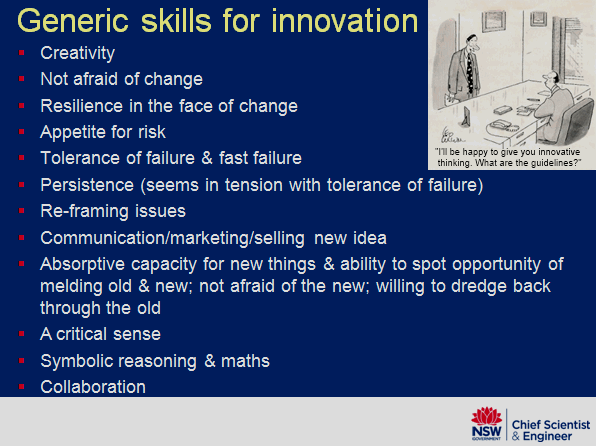|
News & Views item - June 2012 |
![]() Mary O'Kane Asks: Does Australia Have the Education System Its Future Needs?
(June 9, 2012)
Mary O'Kane Asks: Does Australia Have the Education System Its Future Needs?
(June 9, 2012)
New South Wales Chief Scientist and Engineer, Mary O'Kane, is also the current vice-president of the Academy of Technological Sciences and Engineering, and was recently elected to the board of National ICT Australia Ltd (NICTA). She also Chairs the Australian Centre for Renewable Energy, the Development Gateway and the Development Gateway International and is Chair of the CRC for Spatial Information. So when in giving the Harold Wyndham memorial lecture last month she asked rhetorically: The “good enough” education system. Does Australia have the education system it needs for a vibrant economic future?, you might expect that she would be prepared to have some cogent answers, especially since her CV includes being Vice-Chancellor and President of the University of Adelaide from 1996-2001, Deputy Vice-Chancellor (Research) from 1994-96 and prior to that, Dean of the Faculty of Information Sciences and Engineering at the University of Canberra.
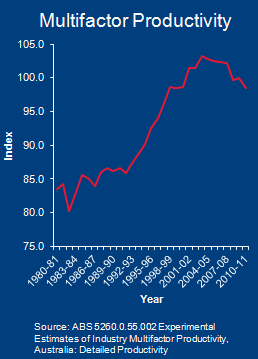
In summary she told her audience: "Concerns are expressed almost daily that while Australia has managed to survive the world economic crisis and is in the midst of a resources-driven boom, the country is facing a major challenge in the decline of its productivity growth. Conventional wisdom tells us that for productivity growth to occur, a nation needs innovation, and a key enabler of that innovation is a strong education system. However there is little discussion about what exactly constitutes such a system and how we can measure the impact of changes in this system in terms of national economic indicators."
Below are excerpts of her address; a complete transcript is available
here![]() .
.
The 1990s saw massive productivity growth and an upsurge of new ICT products, and services and capabilities due to the rise of internet. At this time Australia’s productivity growth was above OECD average for the first time. From about 2003 Australia began to decline in productivity to almost zero and is now going backwards... In a report released by the [Productivity] Commission just last month, Dean Parham argues that a large part of the productivity slump can be attributed to adjustment pressures reflecting an economy in transition, an economy which has seen a build-up of inputs (high company profits and business investments) principally from the mining sector and related industries, without the corresponding outputs.
Early on in the 2008 Innovation Review, I suggested to my colleagues on the panel that we all write on a scrap of paper what we each thought was the one most important factor influencing innovation. Each member of the panel wrote down ‘education’... [but] how much are we, perhaps unwittingly, inhibiting productivity growth in the way we educate our people?
[For this address] I’d like to concentrate on two... well-constructed [productivity] indices that have been produced annually – for at least the last 5 years and which are up-to-date to 2012... They are the World Economic Forum’s Global Competitiveness Index (GCI) [WEF, 2011] and the INSEAD Global Innovation Index (GII) [INSEAD, 2011]
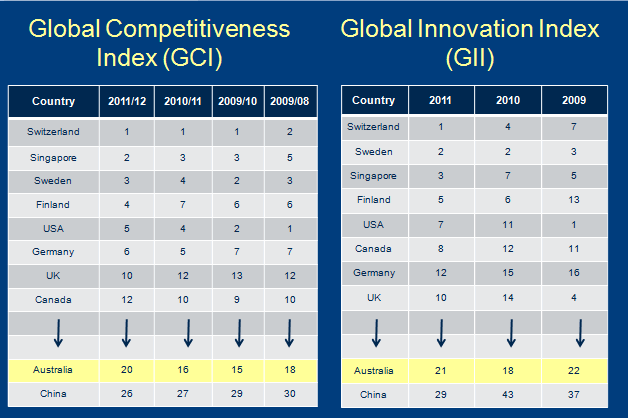
Australia is currently ranked 20th in the world – down from 15th in 2008/09 and 5th in 2001/02 – on the Global Competitiveness Index, and 21st on the Global Innovation Index. Australia seems firmly stuck around 20th place... If we take a closer look at the indices, looking at the individual indicators, we may gain clues into the areas in which Australia ‘needs improvement’ or should be looking to build upon to develop a move innovative nation.
The perceptions from the survey data, the numbers are telling the same story, when it comes to education Australia is seemingly performing well. According to these indices we seem to have a ‘good enough’ education system. But where are we going wrong in the innovation indices? Where is it that we are letting the side down?
Turning to knowledge production and diffusion, Australia ranks highly in terms of scientific outputs in terms of publications – ranked 7th on the world on the Global Innovation Index – but when you put this in combination with other outputs such as patents, licence fees and high tech exports – we are being dragged down in the rankings. We are good at research, but are we good at turning ideas into products and services? Innovation is more than the R&D that you do, but what you do with the R&D.
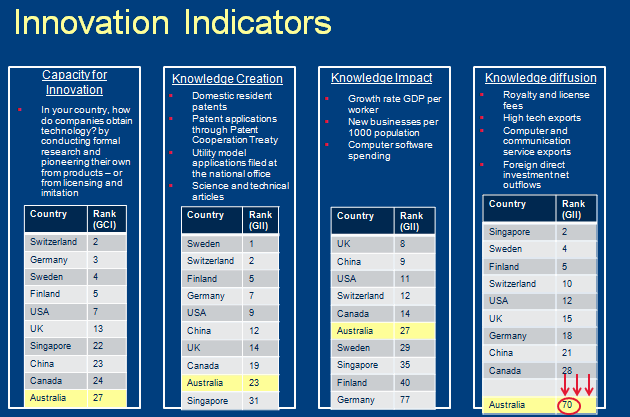
[With regard to innovation indicators] where Australia dives in the rankings is in Knowledge Diffusion – Licence fees, high tech exports, and computer and communication service exports – ranked at 70th place, well behind other countries that rank highly on the overall index – such as Sweden, Finland and the USA.
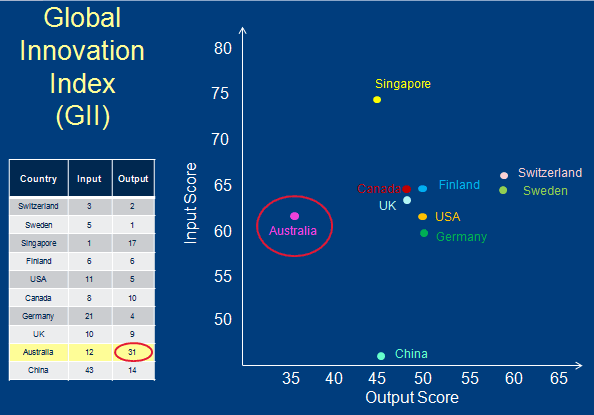
In the Global Innovation Index, the output sub index is clearly dragging
down the overall index ranking - with Australia ranking 12th for inputs, and
31st for outputs. This can be clearly seen in this graph of innovation inputs
scores vs outputs.
Australia stands clearly apart from the major ‘innovative’ countries such as Switzerland, Sweden and Germany. Australia has a similar score as these nations in terms of inputs, but it is the outputs that sets us apart – and this is where improvements need to be made if we want to catch up to these nations.
One of the clear gaps as outlined by the indices is the problem we have in producing enough engineers. For a country which continues to experience mining booms and will do so into the future due to our rich mineral resources, we have found ourselves in a situation where we do not have enough engineers to fill job vacancies. A key reason for this is the drop in students doing maths and science in high school, particularly at advanced levels. This impacts the number of people studying engineering, maths and physics at university. At the same time, there are not enough maths and science teachers, particularly quality teachers who have tertiary qualifications in maths and science. This is not just an academic issue. It has serious implications for Australia’s bottom line and, indeed, our productivity problem.
And at this point Professor O'Kane presents a temporary, partial remedy for the shortage:
Engineering is an ideal candidate for reconsidering its approach to maths. Engineering faculties could be, at a minimum, trialling alternative curricula that allow students with maths aptitude but with no formal maths subjects at HSC, to enter engineering degrees and finish in minimal time. [recognise] that not all students arriving at university [have] the maths confidence or content to manage the highly mathematical nature of the discipline, especially with regard to discrete structures and logic.
And she notes the example of the past recruitment for computer science:
These computer science curriculums presumed no serious background knowledge in maths but included well-managed, well-articulated and entertaining exercises that had a positive effect on student motivation. Through time you could see students' fear of the subject lift and within two to three semesters students had reached the high levels of maths necessary for program verification and theoretical computer science. These were incredibly successful programs that recognised that lack of previous study of maths shouldn't necessarily be a barrier to further study where students are motivated, committed and interested... The key, I believe, is motivation and disabling the psychological fear of maths. Maths subjects which are well crafted, entertaining and properly managed can have a positive effect on student motivation, self-worth and subsequently performance.
Finally:
I think we need to look deeper within our systems and culture at some of the underlying issues affecting our innovation performance. Knowing the reasons why is something that has been elusive for some time... Australians are a competitive bunch that’s for sure. You just need to note our collective obsession with sport to recognise this. But, curiously we are not risk takers. It is here where our seemingly adequate education does not progress to confident, ideas-driven and innovative workplaces, and business models which are internationally recognised and valued... If we are about what is in many ways cultural change, it is more likely to be useful early in schooling where kids can learn the skills of entrepreneurs. It’s also where we begin to understand who has aptitude and can package knowledge and turn it into good business.
Recent research by Shavinina (2011) at the University of Quebec... discusses a rare group of students who are able to both generate ideas and implement them into practice, turning them into products, processes or services. These young innovators are not necessarily ‘gifted’ students so far as the traditional definition goes, but possess an entrepreneurial giftedness and a set of qualities which make them predisposed to innovative thinking and activities... If we do not foster an innovative mindset within our young people and through a dynamic and supportive education framework we will continue to see a fall in our world standing for innovation and competitiveness.
Governments need to think about piloting experimental innovation education programs and maybe selective schools – perhaps a different version in each state – and monitoring the impacts on motivation, performance, confidence levels of students... we need to ensure no child is neglected by the education system but we also need to ensure our education system provides all the necessary tools, flexibility and support for students to enable them to think for themselves and accept failure as a part of the process [and] we also need to consider where we might be unwittingly inhibiting the self-confidence and growth of our young people via too-rigid parts of our education system.
